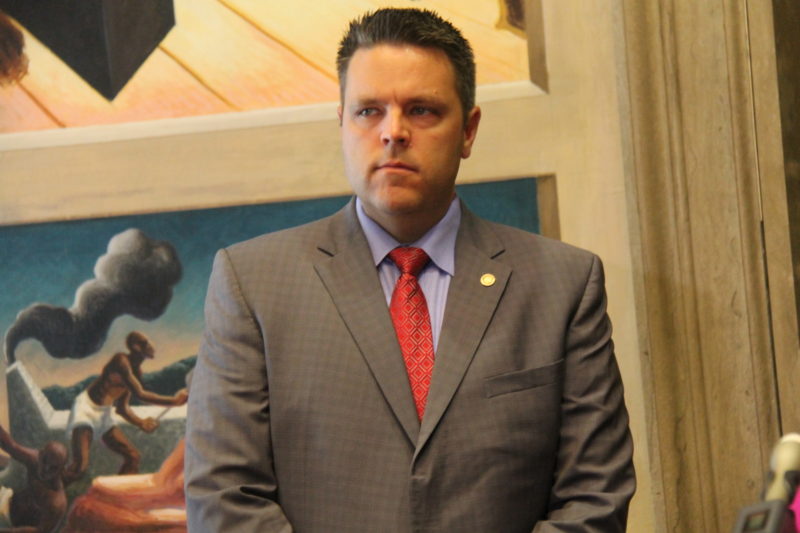As the state has backed away from supervising misdemeanor offenders on probation, private companies have stepped up to handle the service. This move has been a boon for a cash-strapped state.
Private probation alleviates some of the burdens on the correctional system by shifting the financial burden away from the state and, ideally, by reducing the number of people behind bars.
“My staff helps the community and they help the clients,” said Tammy Berg-Neuman, owner of Private Probation Services TBN. “We have contracts with the courts and we answer to the judges. We follow court orders.”
However, critics say a lack of state oversight and accountability has created system ripe for abuse. A Humans Rights Watch report released in February states, “Missouri’s offender-funded private probation system has no checks or balances and the state has basically ‘washed their hands.’”

“We just can’t implement a system and walk away,” Rep. Justin Hill said. “I think we are not monitoring them closely enough.”
For instance, there is no standard to how a private probation company does drug or alcohol testing, an issue that was brought to Hill’s attention by a constituent.
The Missouri Department of Corrections uses Substance Abuse and Mental Health Services Administration’s guidelines for testing. To test positive for alcohol by detecting ETG, there must be more than 1,000 nanograms per milliliter of blood and for marijuana, detecting THC, there must be more than 50 nanograms per milliliter of blood. Test results at or below the cut off are considered negative.
“Some companies test alcohol, ETG, at 100 nanograms per milliliter,” said John DeFriese, whose son’s probation was handled by a private company. “That means if you used hair gel this morning, you’d probably end up with a detect.”
At that level, a person convicted of a misdemeanor offense would be held to a 10 times stricter standard than a convicted felon. Some companies require probationers to undergo drug and alcohol testing even when the person was not charged with a crime involving drugs or alcohol, according to the Human Rights Watch report “Set up to Fail.”
“We do not stray outside the order,” said Berg-Neuman. “I don’t know what other private companies do but my company stays within the court order and follows all of the orders by the court. Let’s say, for example, someone is on probation for a DWI, we are not going to call them in for an alcohol test unless it is court ordered.”
Since there is no statewide oversight or standard, it is unclear how many companies in Missouri follow the same practices as Private Probation Services TBN.
The report found that the cost of private probation disproportionately harms the poor, often criminalizing a person’s inability to pay their probation fees and court costs.
“Lack of accountability in offender-funded private probation systems creates many opportunities for abuse,” said Komala Ramachandra, senior business and human rights researcher at Human Rights Watch. “While probation fees and court costs may only be a slight inconvenience for a person who can afford those costs, they can be ruinous for a person living in poverty.”
The monthly cost of probation supervision provided by the Board of Probation and Parole, which handles those convicted of a felony and domestic assualt, has been capped at $60.127. After studying fees charged by other states, the Board set the standard rate at $30 per month.
In contrast, misdemeanor offenders supervised by private companies pay as much as $50 a month in supervision fees and then additional services — such as drug testing, courses, treatment, community service and electronic monitoring — are added fees to the probationer.
“We don’t beat them when they are down, just because they can’t pay for services,” said Berg-Neuman. “I’ve done a lot of pro bono cases.”
Her company also offers community service instead of fees, which to her knowledge is the only private probation service that offers that option to low-income clients.
“If a court orders someone to be drug tested and they don’t have that money to be drug tested, there is a conflict there,” Berg-Neuman said. “We comply with the court order and drug test them, and give them the option to perform community service in lieu of the payment.”
While the Human Rights Watch found that jailing people only for failure to pay fees and court costs was uncommon, incarceration resulting from failure to comply with all conditions of probation due to inability to pay was more common.
In Missouri, without payment in hand for supervision, background checks, or drug testing, a probationer would be considered a “non-report” by some companies and could be a violation of their probation terms, according to probationers and lawyers interviewed for the report.
Berg-Neuman believes that it is unfair to lump all private probation companies into the same category and that her staff doesn’t deserve that.
For Hill, there is a lot of adjustments Missouri can make on how the state handles private probation.
“The first step is standardizing testing,” Hill said.
He has a bill moving through the General Assembly that would do just that. HB 1344, which was recently perfected by the House, puts private probation drug and alcohol testing at the same level as the state felony probation testing.
“We need to make adjustments, in little increments at a time, to private probation,” said Hill. “We can’t give up oversight.”

Alisha Shurr was a reporter for The Missouri Times and The Missouri Times Magazine. She joined The Missouri Times in January 2018 after working as a copy editor for her hometown newspaper in Southern Oregon. Alisha is a graduate of Kansas State University.









